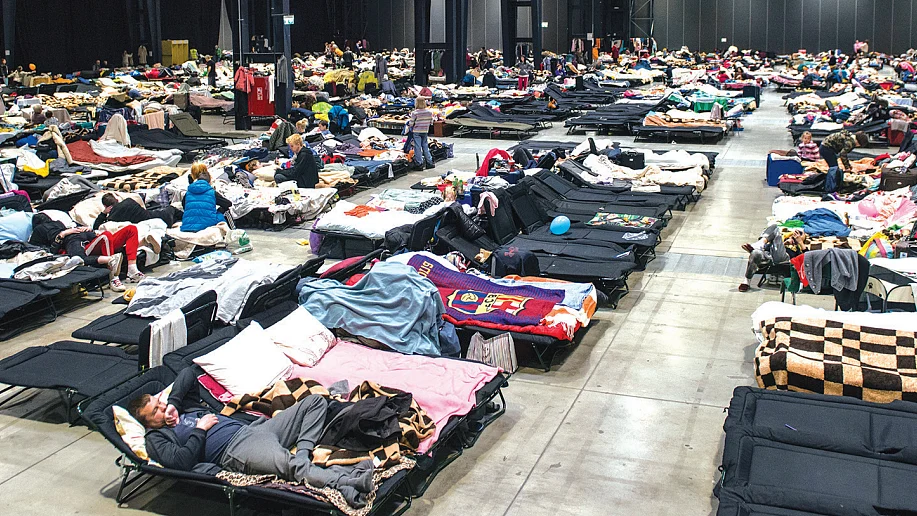Russia-Ukraine war: The decline of the transatlantic empire
As the US and Europe tighten the diplomatic screw on Russia, many see it as the Hail Mary Pass

While the military conflict rages on the ground in Ukraine, the diplomatic onslaught that the West and its allies have mounted on Russia appears to be the biggest in scope in a very long time. While countries like Iran and Syria have been taking on this onslaught for several years now the very fact that Russia is a global power while Iran and Syria are not, gives this tussle a totally new dimension.
This war was indeed years in making and Russia didn’t just attack Ukraine out of the blue. Almost a decade ago, Rand Corporation, a thinktank closely linked with the Pentagon, came out with a policy paper. The paper proposed engineering an internal conflict in Ukraine that will eventually pull Russia in and present the chance to the Western Powers to weaken it militarily or otherwise. The West and Russia were not exactly friends from the days of Boris Yeltsin but they were also not openly confrontational.
When the West-engineered Maidan Coup brought the Ukrainian government down in Kyiv, the scenario presented years ago by Rand Corporation was in play. The West has been training Ukrainian regulars and NeoNazis alike since 2014. When Russia says that this is a de-Nazification campaign as much as it is a demilitarisation one, it is not off the mark.
“West had thoroughly documented the extent of the Nazi ideology in Ukraine’s civil, political, and military structures during and after the 2014 Maidan coup...To acknowledge the existence of this odious ideology by NATO would require it to acknowledge the role it played in training and equipping Azov regiment personnel since 2015,” says Scott Ritter, ex-UN weapon inspector and military analyst.
The open collaboration with Nazis and ultras has tattered the image of NATO and its allies among the vast majority of the Third World. And while it still deploys threats and other coercive measures on countries to toe its line on sanctions against Russia or while voting inside the UN, the resentment that one sees is unprecedented.
Let’s first look at Europe itself. Hungary is openly thumbing NATO’s and EU’s noses. Too bad Viktor Orban won the re-elections despite open interference by the US and allies. Moldova is dithering. Serbia is teetering to the point where its leader has very publicly said that it is toeing NATO’s line only because it is being threatened. A wave of anti-NATO sentiment is rising in Europe. While Macron will in all likelihood assail in the rematch with Marine Le Pen, a more palatable candidate would have turned the tables.
Some countries, especially Poland, appear to be happy with the current situation. During this correspondent’s interaction with a range of Polish officials, it became very clear that Poland is trying hard to hide its glee over the refugee situation. Now that half a million working hands from Ukraine are in Poland, ready to work on wages almost one-third of what an average Pole is paid, the economy especially the real estate and construction sector will see a boom. It is not for nothing that Poles are the most enthusiastic participants in this war.
However, Europe is not just Poland. Several countries from within the EU have agreed to the Russian demand of buying oil and gas in Roubles. Some are already doing so. The inflation in Europe is reaching an unprecedented level and it will erode the present anti-Russia enthusiasm against the “Atlantist” part of the population there to a large extent.
While Europe puts a brave face across, it is shuddering at the prospect of neo-Nazis and Ultra-Rights coming to power on the wave of discontent. Do remember here that this situation has come to pass even before Russia has put any significant countermeasures.
And while the US under the guidance of arch Russophobe Victoria Nuland quite literally wants the EU to eff off, Biden Administration’s position domestically is shakier than ever. This week the approval rating for the incumbent reached a historic low. This low approval coupled with rapidly rising inflation will ensure that Republicans sweep the mid-terms.
Globally, the pushback is even more severe. The GCC countries, especially Saudi Arabia and the UAE, have not only resisted the American pressure, but they have also gone on to poke in its eyes. One can imagine that if regional powerlings like UAE and Saudi Arabia are not capitulating, what to say of a real global power like China. China understands that if it lets the West get away with their current mechanisation, the same playbook will be used on China, and soon. Therefore, it will go out of its way to help Russia blunt the edge of sanctions.
There are several fields where both countries can cooperate. Historical lack of trust has hindered this process in the past, but now that the push has come to shove, a close entanglement between the two is a fait accompli.
Synergy is developing here and no amount of Western pressure on China is working. This has rattled the West. It knows that unlike what it has on India, it has no leverage to speak of over China and thus pressure will likely lead to a confrontation that the West cannot afford at this juncture.
Russia has the option to work with other regional powers like Iran as well. And while its dentate with Pakistan appears to have been nipped in the bud in what is increasingly appearing to be a US-signalled post-modern coup, Russia can look towards India, Indonesia, Malaysia besides long-term allies like Egypt, Syria and Algeria to help it assail.
That said, Russia will feel the pinch in the short to medium-term.
(This was first published in National Herald on Sunday)
Follow us on: Facebook, Twitter, Google News, Instagram
Join our official telegram channel (@nationalherald) and stay updated with the latest headlines
